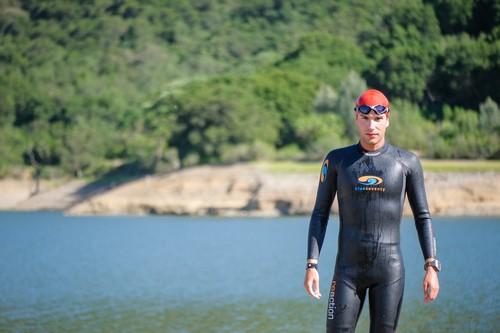Mike Portman had a typical childhood of school and sports. Over the years he became more of a couch potato, and when he started college he was on anti-depressants and taking two naps a day due to being always tired. He never felt energetic or happy and he always tried to find to magical pill or food that would solve all his woes. Then one day in a philosophy class his teacher mentioned that he himself was a vegetarian. Mike was intrigued and that’s when everything started to lead him to where he is now.
Over the college years, Mike started running and then became a triathlete. He has become a winner of multiple races and it is common to see him on the podium whether overall or his age group. Attributing much of his gains to his positive mental outlook to training and vegan diet Mike also coaches athletes in endurance sports to help them get the results they desire.

Why Vegan?
How and why did you decide to become a vegan?
I become vegan after I learned about the environmental impact a person’s diet has on the planet. After I learned this, I slowly made changes to my diet and lifestyle. Went lacto-ovo vegetarian for 2 years and then though if I was really serious about what I stand for, then I should become fully vegan. Since the process for me was rather slow compared to most, it wasn’t too hard of a shift to be 100% animal-free when I made the commitment.
How long have you been vegan?
It’s been over 5 years. Didn’t really have a start date, it just happened.
What has benefited you the most from being a vegan?
Hard to say, as so many things in my life have improved. I’d probably say my quality of life has benefited most overall. The way I feel mentally and physically almost always stays constant. That way of feeling keeps me motivated on tackling the day whether it’s training, coaching, or something else.
What does veganism mean to you?
To me veganism means a lifestyle that is not limiting the way you live your life, but embracing ways that are healthy for yourself, others, animals, and the planet.
Training
What sort of training do you do?
I am a triathlete. Which means I perform in races that are swimming, biking, and running all in one day. Back to back…. to back.
How often do you (need to) train?
It depends on the time of year and what I am training for, but on average, it’s 3-4 hours a day. Some days more, some days less. This includes swimming, biking, running, and cross training (functional strength + core work). I spread out the workload so it’s usually swim and run one day, then bike and core work another. Layers upon layers is what makes an athlete great.
Do you offer your fitness or training services to others?
Yes. With USA Triathlon certification, I
coach people in person or globally in building training plans for endurance athletes to meet their goals. It’s a great line of work and very rewarding.
Strengths, Weaknesses & Outside Influences
What do you think is the biggest misconception about vegans and how do you address this?
That we are weak and malnourished. Plant-based whole foods have no competition when it comes to the amount of nutrients they bring to an individual, per calorie. If you are a vegan and eat enough calories from whole fruits, veggies, nuts, seeds, and beans then you are a nutrient powerhouse!
What are you strengths as a vegan athlete?
All endurance athletes thrive on roughly the same macronutrient percentages of carbohydrates, proteins, and fats. The downside of animal foods is that they give the human body no carbohydrates. Plant foods are the only foods that have carbohydrates, which is the macronutrient that endurance athletes need the most of before, during, and after a workout. The great thing about being a vegan is that I never need to worry that my body doesn’t have enough carbs in my system to perform optimally.
What is your biggest challenge?
Traveling can be tough. Living in California makes it easy as we have such a great supply of fresh produce, but travelling can sometimes be difficult. It’s easy to stay vegan, at least in the United States, but sometimes the choices of good high quality food can be limited.
Are the non-vegans in your industry supportive or not?
It varies from athlete to athlete. Usually the more experienced athletes are more supportive as they know the value of lots of fruits and vegetables in their own diet. The concerns usually come from people who are new and/or aren’t as knowledgeable. Leading by example is the best educator around.
Are your family and friends supportive of your vegan lifestyle?
At first, many were concerned as it was something that they didn’t know much about. But over time as they realized not only am I surviving, but thriving this way - they understood more about the lifestyle being more than sustainable.
What is the most common question/comment that people ask/say when they find out that you are a vegan and how do you respond?
I’ve accepted that I will probably live the rest of my life answering the protein concerns. I do not roll my eyes as before I made the switch I had the same questions and concerns. I answer by saying that the only way a vegan who eats fruits, veggies, nuts, and seeds will be protein-deficient is by really under-eating their calorie needs. By people observing what I eat, they understand that I definitely eat enough!
Who or what motivates you?
One of the biggest motivators for me is actually negative energy. People who say I cannot do something due to what I don’t eat or do. Many people work well with positive encouragement. I like it from time to time but for me I don’t need someone to encourage me to work harder. Perhaps that is why I enjoy doing triathlons as it’s a sport in which you spend a lot of time alone training. To do well a person really needs to ‘enjoy’ working hard and being alone with their thoughts.
Food & Supplements
What do you eat for:
Breakfast – Usually some type of smoothie. I really enjoy frozen bananas, mangoes, and dates blended into an ‘ice cream’.
Lunch – By this time I’ve done at least one workout so I usually have a bowl of whole grains (brown rice or quinoa) topped with veggies, herbs, and avocado.
Dinner – Usually some type of green smoothie. A common one I make is 2 bananas, berries, hemp seeds, and a leafy green (usually kale, spinach, or collard greens)
Snacks (healthy & not-so healthy) – I’m a sucker for dates or bananas with peanut butter. It’s a good source of protein and fiber which is what I try to eat in all my meals or snacks. I suggest the peanut butter without sugar, oil, and salt.
What is your favorite source of:
Protein – Hemp seeds or leafy greens
Calcium - Kale
Iron – Kale - you can never go wrong with kale!
What foods give you the most energy?
Fruit as it’s aasy to absorb the sugars to give me good energy throughout my day. That plus the fiber prevents me from having sugar spikes and crashing an hour later.
Do you take any supplements?
I take B-12 a few times a year as well as protein powder as insurance to make sure I have enough protein to recover from workouts.
Advice
What is your top tip for:
Gaining muscle – Work out! No food, supplement, or powder that promises muscle gains will make you gain muscle. If they did bulk people up and make them ripped then there would be no point in going to the gym.
Losing weight – Concentrate on eating better. More foods from the produce aisle and try to limit the oils you eat. Once a person eats better then the pounds will go away on their own. It’s not about diet, it’s about your lifestyle.
Maintaining weight – Count your calories and make sure you are eating enough. If you are vegan who eats minimally processed plant-based whole foods you’d be surprised on how much you have to eat to maintain weight.
Improving metabolism – Protein and fiber. Those together help keep a person’s metabolic efficiency constant. Some examples – fruit with peanut butter, green smoothie, blended frozen bananas with hemp seeds. Also, have your breakfast be the largest meal of the day. That helps curb off cravings throughout the day to stay lean.
Toning up – Use it or lose it!
How do you promote veganism in your daily life?
Leading by example. No one will ever believe what you say about the benefits of eating a plant based diet unless you can back up your claims with real life examples. There’s no better real life example than yourself so work hard, eat well, and enjoy whatever you do.
Stay tuned for upcoming interviews with other Vegan Athletes, Fitness Fanatics and Exercise Enthusiasts by Subscribing via RSS.

 This work is licenced under a Creative Commons Attribution-NonCommercial-NoDerivs 3.0 Australia Licence
This work is licenced under a Creative Commons Attribution-NonCommercial-NoDerivs 3.0 Australia Licence
